10+ SAMPLE Informative Thesis Statement
-
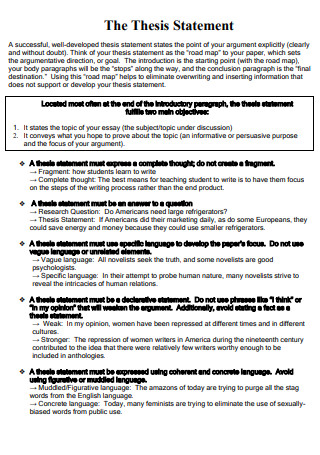
Informative Argument Thesis Statement
download now -
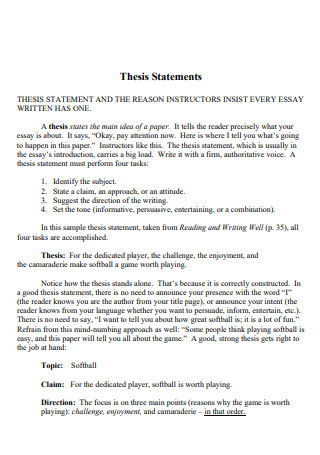
Informative Essay Thesis Statement
download now -
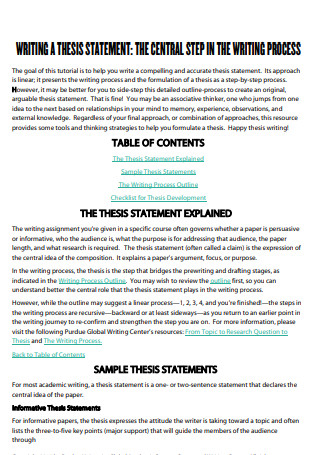
Informative Process Thesis Statement
download now -
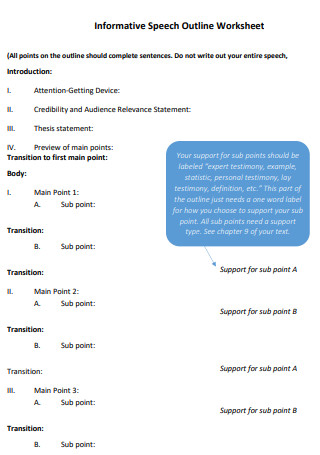
Informative Speech Outline Thesis Statement
download now -
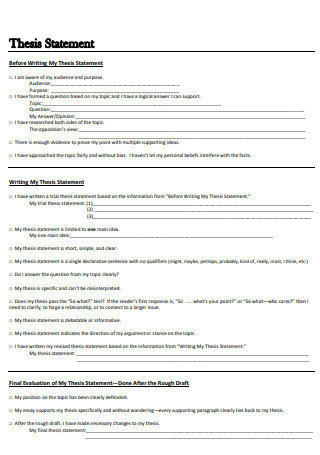
Informative Evaluation Thesis Statement
download now -
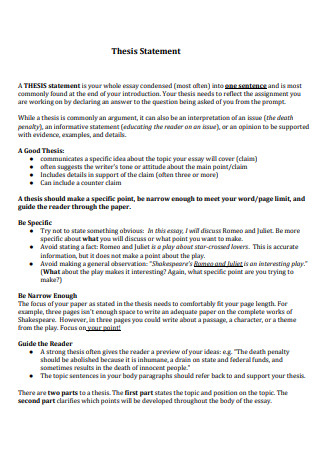
Good Informative Thesis Statement
download now -
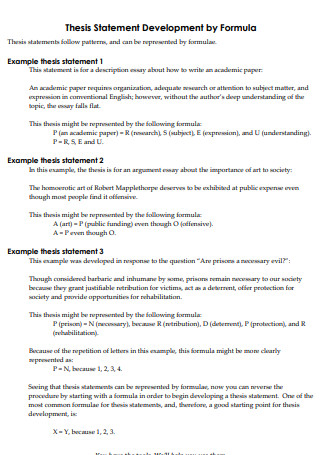
Informative Development Formula Thesis Statement
download now -
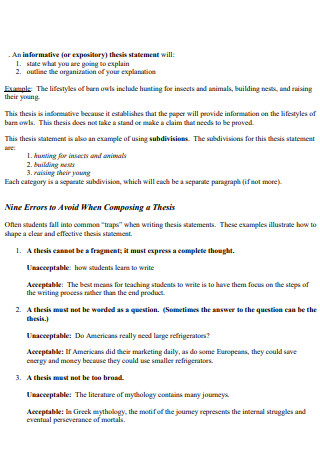
Informative Expository Thesis Statement
download now -
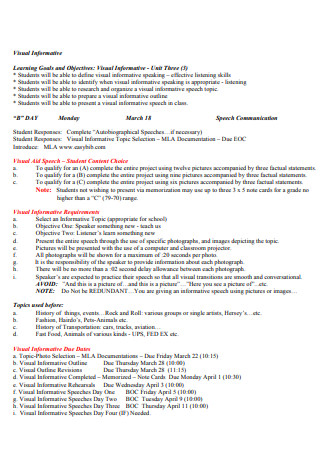
Informative Speech Thesis Statement
download now -
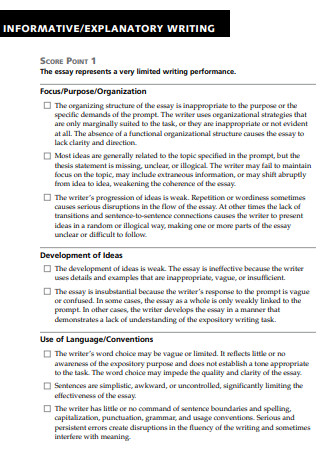
Informative Explanatory Thesis Statement
download now -
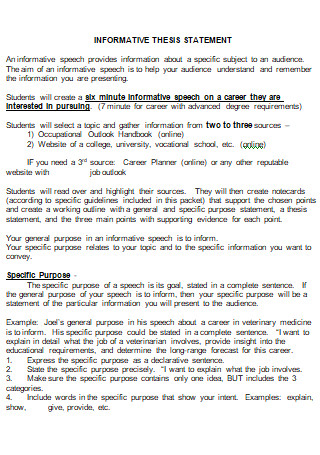
Informative Thesis Statement Example
download now
FREE Informative Thesis Statement s to Download
10+ SAMPLE Informative Thesis Statement
What Is an Informative Thesis Statement?
Characteristics of an Effective Thesis Statement
The Different Types of Thesis Statements
How to Write an Informative Thesis Statement
FAQs
What is a thesis statement?
What makes a strong thesis statement?
What should an informative thesis statement look like?
What Is an Informative Thesis Statement?
The informative thesis statement definition is for an informative essay that describes the issue and highlights the main findings for the reader. A thesis statement for informative speaking should be a definite, unambiguous, and succinct statement that tells the audience what to expect from your speech. A thesis statement for a persuasive essay and speech should have a limited focus and be debatable; there must be an argument to develop inside the study. Your thesis statement will clarify the topic of your essay, and it is a crucial means of summarizing your main findings and setting the stage for your readers. However, writing an insightful thesis statement is not always easy. You are stating the aim of your essay in this statement, but you are not creating an argument or expressing a point of view as you might in another piece of writing. Your thesis statement should be concise and easy to understand for readers, and it should entice them to keep reading to discover more about the issue. A good informative thesis statement will have certain characteristics and elements that are elaborated on further in the article.
Characteristics of an Effective Thesis Statement
A well-written thesis statement establishes the paper’s primary emphasis. Readers should be able to tell what the author of the article intends to prove throughout the essay by reading the thesis statement. Writers may build a fascinating opening to their paper by writing an intriguing and powerful thesis that both attracts readers and inspires enthusiasm about the paper’s content. If you need additional references, then sample informative thesis statement examples are provided within the site. Some templates can be used if you are short on time and in need of an immediate thesis statement for your informative paper.
The Different Types of Thesis Statements
There are various types of thesis statements that you can utilize for your study. These are explanatory, argumentative, or analytical. The thesis statement’s format is determined by the type of paper. A thesis statement is usually one line long and placed after your introduction. It is focused on one to three points relating to a key thesis, which you will try to substantiate in the body of your paper. Thus, the thesis foreshadows the essay’s topic and how you will structure your facts. A thesis statement does not describe a problem but rather aids in its analysis.
How to Write an Informative Thesis Statement
Preparing to draft the informative thesis statement will require time and initial research design, as you will need to conduct preliminary research on the topic of your study. You won’t be jumping right into the process since you would need to know if the thesis statement is viable for your informative study or if it does not apply to your intended content. In a similar sense, a thesis statement for an informative speech will also require numerous hours to complete before it is ready to be spoken in front of an audience. An example of an informative thesis statement is prepared and ready for you to go over to get a better understanding of the sentence structure.
Step 1: Summarize Your Paper’s Major Point
For the very first section of this guide and the first step that you will be following is to construct a sentence that can encapsulate the main idea of your informative thesis study. If writing it out in a single sentence is challenging, then you can start by composing an outline that will showcase and indicate the point of your paper. Then after you have made such an outline, you can slowly construct a sentence that will then be acting as your thesis statement. Keep in mind that this may not immediately be your final thesis statement as you will undergo revisions.
Step 2: List Out Foundations to Support the Statement
Following after constructing your thesis statement, you will then be drafting out reasons that can support the claim you are making. Your thesis statement can’t just be conjured up out of nowhere, without sufficient evidence to support it. This is why this section will indicate how it can support your statement of your informative speech thesis statement. Even if you list them out as bullet points, then you can still make use of them in the future by adding them to the body content of your study. What matters is that these points directly support the statement you are making which will validate its purpose in your thesis study.
Step 3: Create Counter-Arguments
After you list out facts and data that support your thesis statement, the next thing you will be doing is creating a separate list that counters your claim. If you are confused as to why this is necessary, then the quick explanation is that it is important to provide an avenue for improvement.
FAQs
What is a thesis statement?
A thesis statement is a phrase that explains your paper’s topic and goal. A strong thesis statement will guide the framework of your essay and help your reader grasp the concepts you will explore in your article. Thesis statements are typically one sentence long; but, in some situations, for example, an in-depth article, a lengthier thesis statement may be suitable. Consult your professor if you feel you need to use a thesis statement that is more than one sentence. The thesis statement is often put after the first paragraph. It is used early in the essay to educate the reader on the key crucial topic that underpins the whole argument.
What makes a strong thesis statement?
A powerful thesis statement is clear, precise, forceful, confident, and demonstrable. A solid thesis presents readers with an argument that can be contested and backed by evidence. While a poor thesis is just a proclamation of your topic or comprises an unarguable fact. A good thesis statement should combine particular facts with simple wording since your objective is to express an argument in detail without overloading your audience.
What should an informative thesis statement look like?
A thesis statement for informative delivery should be a definite, unambiguous, and succinct statement that tells the audience what to expect from your speech. Since this document is meant for persuasive writing, it should have content focused on a specific topic and be open for arguments and debate; there must be an argument to develop inside the speech. An important factor when writing a thesis statement includes clarity and simplicity since your purpose is to express an argument without confusing your readers. So, although you are placing the thesis statement in the introductory paragraph section, you will still need to provide further background in the body content and conclude it in the ending section of your paper.
Informative thesis statements will be most effective if you are able to get the message across while also conveying the various characteristics it is meant to. With that being said, constructing an informative thesis statement is not easy but you don’t have to worry about that because this article not only helps you out with carefully written steps but also has examples that you can use and refer to.
